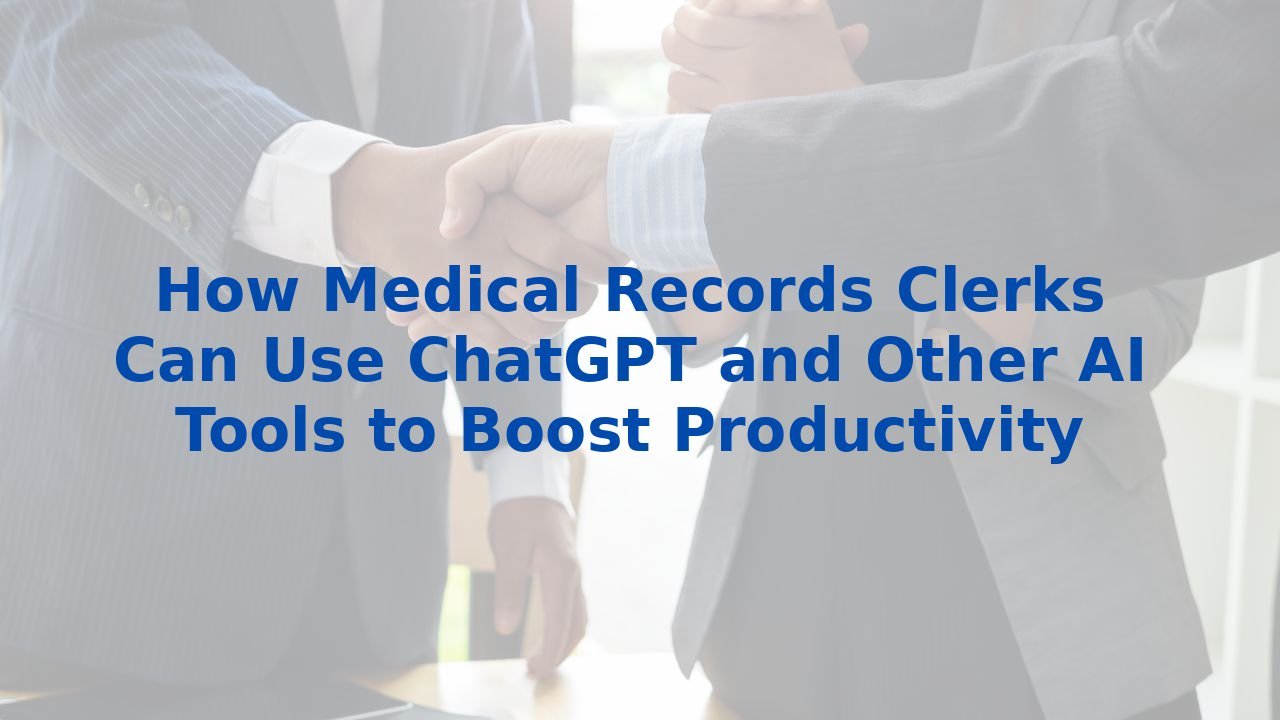How Medical Records Clerks Can Use ChatGPT and Other AI Tools to Boost Productivity
Transforming Productivity Through Artificial Intelligence
Artificial Intelligence (AI) offers immense potential for transforming the healthcare industry, and medical records clerks are no exception. By leveraging AI tools, these professionals can significantly boost productivity and efficiency. The advent of AI-powered applications streamlines numerous tasks that traditionally required hours of manual labor, allowing medical records clerks to focus on more critical functions. Let’s dive into how AI, specifically ChatGPT and other AI tools, can help.
Streamlining with ChatGPT: Practical Applications
Data Entry and Coding Assistance
One of the most time-consuming tasks for medical records clerks is data entry and medical coding. ChatGPT can assist by understanding medical terminology and coding systems such as ICD-10. By simply inputting a patient's medical history or diagnosis, ChatGPT can suggest the appropriate codes, check for errors, and ensure compatibility with insurance requirements, freeing clerks from hours of verification and manual coding.
Automated Report Generation
Creating comprehensive reports involves gathering patient data, summarizing medical histories, and ensuring accuracy. ChatGPT can generate succinct and accurate reports from a variety of patient records. It can summarize findings, create patient discharge summaries, and format the documents based on organizational templates, saving significant time.
Record Retrieval and Organization
Medical records clerks often need to locate specific information from a large database of records. ChatGPT, utilizing natural language processing, can quickly sift through vast amounts of data to retrieve the required documents or information based on simple query prompts, improving retrieval times and reducing the hassle of manual searches.
Prompts to Enhance Efficiency with ChatGPT
Prompts for Accurate Medical Coding
Prompt 1: "Assign the correct ICD-10 code to a patient diagnosed with type 2 diabetes and hypertension."
Prompt 2: "What is the ICD-10 code for a patient with a fractured femur?"
Prompts for Report Generation
Prompt 1: "Generate a discharge summary for a patient with a recent hospital stay due to pneumonia."
Prompt 2: "Create a comprehensive medical history report for a patient with chronic heart disease and provide a summary."
Prompts for Record Retrieval
Prompt 1: "Retrieve all records of patients admitted for acute respiratory distress syndrome (ARDS) in the past year."
Prompt 2: "List all patient records with a diagnosis of arthritis that required surgical intervention."
Other AI Tools for Medical Records Clerks
Natural Language Processing (NLP) Software
NLP tools can be used to transcribe doctor’s notes, converting spoken language into written text accurately. This technology can transform lengthy dictations into concise records, saving considerable time.
Optical Character Recognition (OCR)
OCR technology can convert different types of documents, such as scanned paper documents or images taken by a digital camera, into editable and searchable data. This helps to digitize patient records seamlessly.
Predictive Analytics
Predictive analytics can be used to forecast patient admission rates, departmental needs, and other operational elements. This insight allows clerks to manage workflow more efficiently and allocate resources where needed most.
The Future: AI-Driven Enhancements
As AI continues to evolve, medical records clerks will see even more innovative applications tailored to their needs. Advanced predictive models could forecast patient needs and trends with great precision, providing essential insights for better resource management. AI may also improve interoperability between different health IT systems, ensuring seamless data exchange and reducing redundancies. The potential for reducing human error through enhanced data validation and automated error-checking mechanisms is another promising development.
The Importance of Embracing AI for Career Growth
The necessity for medical records clerks to learn AI cannot be overstated. AI is not a job terminator but a job enhancer. By integrating AI into daily tasks, clerks can dramatically increase their productivity and accuracy, positioning themselves as invaluable assets to the healthcare organization. The ability to accomplish more in less time translates to increased job satisfaction, better patient outcomes, and the potential for higher earnings.
Those who resist adapting to AI may find themselves outpaced by colleagues who embrace these tools. Therefore, continuous learning and staying up-to-date with AI advancements will be crucial. AI won't take your job, but medical records clerks who use AI will take the jobs of those who don't. Mastering AI can mean the difference between mundane, repetitive tasks and engaging, impactful work that propels your career forward.
Are you looking for over 15 different ways Medical Records Clerks can use AI, 1000s of additional prompts to support you with your work, video training and more? Complete AI Training supports Medical Records Clerks to learn AI and to always be up to date on AI. Visit this comprehensive course for more details. Also, refer to our book that's available on Amazon Kindle and Amazon Paperback.



